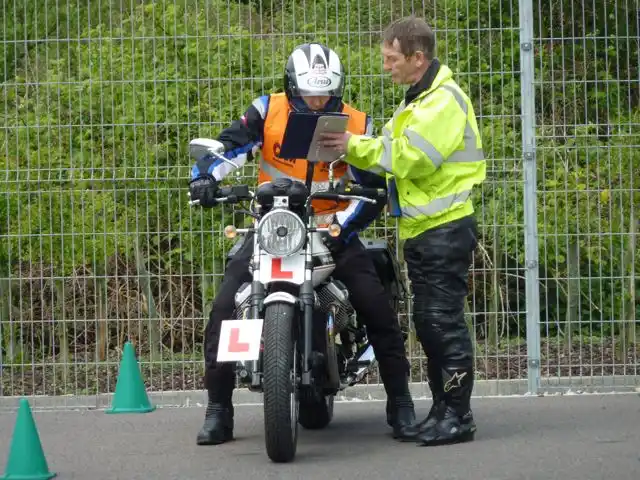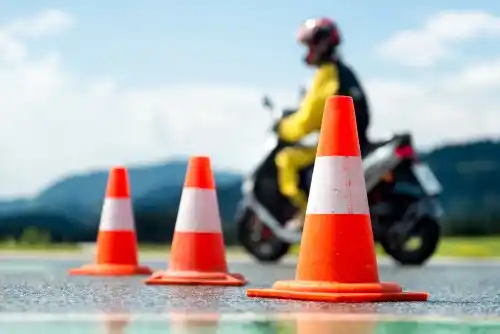Book a motorcycle test in Torpoint, Cornwall with any of the companies listed here
Click on any of the motorcycle training schools below to view more information and check availability.
1st Class Motorcycle Training Plymouth
Coypool Park & Ride Lower car park, Coypool Road, Plymouth, Devon, PL7 4NW
Approx. distance: 5.2 miles
U Pass Motorcycle Training Devon Newton Abbot
Trago Mills, Stover, Newton Abbot, Devon, TQ12 6JD
Approx. distance: 26.5 miles
Coast Motorcycle Training Paignton
South Devon College, Vantage Point, Long Road, Paignton, Devon, TQ4 7EJ
Approx. distance: 27 miles
Damerells Training Cornwall
Lodge Way, Indian Queens, TR9 6TF
Approx. distance: 32.3 miles
Triumph Training Exeter
Motorcycle Training Centre, Cofton Road, Exeter, Devon, EX2 8QW
Approx. distance: 37.3 miles
Anthonys Motorcycle Training Exmouth
Maer Road Car Park, Exmouth, Devon, EX8 2DB
Approx. distance: 38.8 miles
MTS Rider Training Devon
Red One Ltd, Clyst St Mary, Exeter, Devon, EX5 1DJ
Approx. distance: 40.7 miles
North Coast Motorcycle Training Cornwall
Blackwater CP School, North Hill, Cornwall, TR4 8ES
Approx. distance: 44.3 miles
Camborne Motorcycle Training
Roskear School, Camborne, Cornwall, TR14 8DJ
Approx. distance: 49.7 miles
East Devon Motorcycle Training
Doatshayne Farm, Devon, EX13 8AF
Approx. distance: 57.9 miles

Find a motorcycle test in Torpoint, Cornwall
If you are looking for a motorcycle test in Torpoint then look no further! We have all the information here for you to find suitable motorcycle training and testing close to you or in the surrounding areas of Plymouth, Saltash and Callington.
What are the different types of motorcycle licence I can get in Torpoint?
There are 4 main types of full motorcycle licence issued by the DVSA. The first three (AM, A1 and A2 motorcycle licences) have restrictions on the type of moped or motorcycle you can ride, the fourth (the full A motorcycle licence) has no restrictions.
The AM restricted moped licence
The A1 restricted motorcycle licence
The minimum age to take this test is 17. According to the DVSA website it will allow you to ride a "Light motorcycle up to 11 kW (and a power-to-weight ratio not more than 0.1 kW per kg) and 125 cc". This means it's up to a 125 cc motorcycle with some restrictions to make sure it cannot accelerate too fast - a really good idea when you are new to riding a motorbike!
Requirements to take the A1 motorcycle test - You must have a UK provisional or full driving licence, a valid theory test certificate and a valid CBT certificate. Once you have taken this test you will not have to keep renewing your CBT certificate every 2 years, you can ride on motorways and you can take a pillion passenger on the back of your motorbike.
The A2 restricted motorcycle licence
For this licence you need to be at least 19 years of age, have completed your CBT or have had an A1 licence for at least 2 years. As with the A1 test you also need to have a UK provisional or full driving licence and a valid theory test certificate . The main benefit of getting an A2 licence is you can ride a more powerful motorcycle. The law states a "standard motorcycle up to 35 kW (and a power-to-weight ratio not more than 0.2 kW per kg)". So it's a more powerful bike, but still not completely un-restricted. To find A2 legal motorbikes you are best visiting your local motorcycle dealer and asking them to show you the A2 legal bikes, as otherwise it's very difficult to work out just looking at the tech specs.
The full A motorcycle licence, or DAS licence.
This is the licence that allows you to ride almost any motorcycle without restrictions, so it's the ultimate motorcycle licence. No limits on power outputs or power per kg or engine size! It is also called a 'DAS' licence as it can be obtained from the 'Direct AccesS' route. There are two ways you can get this licence:
1) If you are 24 or over you can take the tests for an A licence. You must also have a UK provisional or full driving licence, a valid theory test certificate and a valid CBT certificate.
2) If you are at least 21 years of age and you have held an A2 category licence for at least 2 years. This is sometimes referred to as the 'progressive access' route as you progress from one licence to another.
When taking the test the biggest difference is that you have to use a bigger, more powerful motorcycle. It will have a power of at least 40kw and an engine cc of at least 595 cc. Your local training school will make sure you have the right size bike for your test.
There is also a flowchart (click here) that the DVLA have produced that shows these different licences and how to obtain them.
To get more detailed guidance on what licence is right for you then talk to your local motorcycle training school. You can search for them here and they are qualified to speak to you on the right type of training for you.
How do I get the right training in Torpoint for the full A motorcycle licence?
The A motorcycle licence (also known as the DAS licence) is an unrestricted licence you can get when you are 24 or over. You are allowed to ride any road legal motorcycle of any power or engine size. You can also get the full A licence if you are younger than 24 if you pass your A2 restricted licence first. After holding the A2 restricted licence for 2 years you are able to take the tests for a full A licence. Given that the earliest you can take the A2 test is 19 then the earliest you could take your full A test is 21. It is essential that you get the right training for this licence as without it you are likely to hurt yourself or even worse, someone else. Use this website to enter your postcode and search for your local motorcycle training school. They are all fully qualified to advise you on the training you will need. Although saving money is something everyone wants to do, the right training will save your life. Therefore don't just focus on price, look at the quality of training on offer and the standard of training.

What is the Enhanced Rider Scheme (ERS)?
This scheme was devised by the DVSA and the motorcycle industry. The ERS course is run by many motorcycle training companies around the UK. It is for anyone who has a full motorcycle licence and wishes to check their safe riding skills. Not only will it make you a better rider but some insurance companies offer cheaper motorcycle insurance if you have been issued with a DVSA Certificate Of Competence. You will receive this certificate at the end of your ERS course if the instructor deems you to be a safe rider. If the instructor feels you need additional training it may be given on the day, or if it is felt you need a larger amount of training then you may need to come back on another day. Although ERS is not a test it is much like a CBT: provided you demonstrate a safe level of riding and knowledge during the day then you will be issued with your certificate.
The DVSA has produced a short video showing what the Enhanced Rider Scheme is all about:
Click here to watch DVSA video
When can I take a pillion passenger on the back of my motorcycle?
In order to carry someone on the back of your motorbike you need to have a full motorcycle licence. This means one of the AM, A1, A2 or full A (also known as DAS) licences. This means that you cannot carry a pillion passenger if you only have a provisional licence, even if you have done a CBT. A CBT is not enough for you to take a pillion under any circumstances.
Even when you have passed your full motorcycle test you will need to make sure your motorcycle is properly equipped to take a pillion. As the rider you are legally responsible for your passenger, so it is very much in your interests to make sure your motorcycle is properly equipped. This means making sure there is a proper seat with foot rests and grab rail to hold on to. Your passenger must also wear a safety helmet (as well as all the other protective clothing!). Don't forget also that riding a motorcycle with a pillion is quite different than riding solo, so read up about the changes you need to make to your motorbike and riding style before attempting to take a pillion passenger.